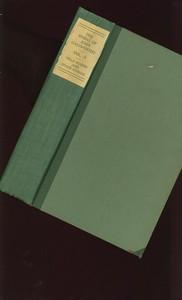Read this ebook for free! No credit card needed, absolutely nothing to pay.
Words: 20100 in 4 pages
This is an ebook sharing website. You can read the uploaded ebooks for free here. No credit cards needed, nothing to pay. If you want to own a digital copy of the ebook, or want to read offline with your favorite ebook-reader, then you can choose to buy and download the ebook.


: George Cruikshank by Thackeray William Makepeace - Caricatures and cartoons Great Britain; English wit and humor Pictorial; Cruikshank George 1792-1878
GEORGE CRUIKSHANK
Accusations of ingratitude, and just accusations no doubt, are made against every inhabitant of this wicked world, and the fact is, that a man who is ceaselessly engaged in its trouble and turmoil, borne hither and thither upon the fierce waves of the crowd, bustling, shifting, struggling to keep himself somewhat above water--fighting for reputation, or more likely for bread, and ceaselessly occupied to-day with plans for appeasing the eternal appetite of inevitable hunger to-morrow--a man in such straits has hardly time to think of anything but himself, and, as in a sinking ship, must make his own rush for the boats, and fight, struggle, and trample for safety. In the midst of such a combat as this, the "ingenious arts, which prevent the ferocity of the manners, and act upon them as an emollient" are likely to be jostled to death, and then forgotten. The world will allow no such compromises between it and that which does not belong to it--no two gods must we serve; but the horrible glazed eyes of Necessity are always fixed upon you; fly away as you will, black Care sits behind you, and with his ceaseless gloomy croaking drowns the voice of all more cheerful companions. Happy he whose fortune has placed him where there is calm and plenty, and who has the wisdom not to give up his quiet in quest of visionary gain.
Here is, no doubt, the reason why a man, after the period of his boyhood, or first youth, makes so few friends. Want and ambition thrust away all other society from him. Some old friends remain, it is true, but these are become as a habit--a part of your selfishness; and, for new ones, they are selfish as you are. Neither member of the new partnership has the capital of affection and kindly feeling, or can even afford the time that is requisite for the establishment of the new firm. Damp and chill the shades of the prison-house begin to close round us, and that "vision splendid" which has accompanied our steps in our journey daily farther from the east, fades away and dies into the light of common day.
And what a common day! what a foggy, dull, shivering apology for light is this kind of muddy twilight through which we are about to tramp and flounder for the rest of our existence, wandering farther and farther from the beauty and freshness and from the kindly gushing springs of clear gladness that made all around us green in our youth! One wanders and gropes in a slough of stock-jobbing, one sinks or rises in a storm of politics, and in either case it is as good to fall as to rise--to mount a bubble on the crest of the wave, as to sink a stone to the bottom.
Knight's, in Sweeting's Alley; Fairburn's, in a court off Ludgate Hill; Hone's, in Fleet Street--bright, enchanted palaces, which George Cruikshank used to people with grinning, fantastical imps, and merry, harmless sprites,--where are they? Fairburn's shop knows him no more; not only has Knight disappeared from Sweeting's Alley, but, as we are given to understand, Sweetings Alley has disappeared from the face of the globe. Slop, the atrocious Castlereagh, the sainted Caroline , the "Dandy of sixty," who used to glance at us from Hone's friendly windows--where are they? Mr. Cruikshank may have drawn a thousand better things since the days when these were; but they are to us a thousand times more pleasing than anything else he has done. How we used to believe in them! to stray miles out of the way on holidays, in order to ponder for an hour before that delightful window in Sweeting's Alley! in walks through Fleet Street, to vanish abruptly down Fairburn's passage, and there make one at his "charming gratis" exhibition. There used to be a crowd round the window in those days, of grinning, good-natured mechanics, who spelt the songs, and spoke them out for the benefit of the company, and who received the points of humor with a general sympathizing roar. Where are these people now? You never hear any laughing at HB.; his pictures are a great deal too genteel for that--polite points of wit, which strike one as exceedingly clever and pretty, and cause one to smile in a quiet, gentleman-like kind of way.
"Who has not chased the butterfly, And crushed its slender legs and wings, And heaved a moralizing sigh: Alas! how frail are human things!"
A very unexceptionable morality truly; but it would have puzzled another than George Cruikshank to make mirth out of it as he has done. Away, surely not on the wings of these verses, Cruikshank's imagination begins to soar; and he makes us three darling little men on a green common, backed by old farmhouses, somewhere about May. A great mixture of blue and clouds in the air, a strong fresh breeze stirring, Tom's jacket flapping in the same, in order to bring down the insect queen or king of spring that is fluttering above him,--he renders all this with a few strokes on a little block of wood not two inches square, upon which one may gaze for hours, so merry and lifelike a scene does it present. What a charming creative power is this, what a privilege--to be a god, and create little worlds upon paper, and whole generations of smiling, jovial men, women, and children half inch high, whose portraits are carried abroad, and have the faculty of making us monsters of six feet curious and happy in our turn. Now, who would imagine that an artist could make anything of such a subject as this? The writer begins by stating,--
"I love to go back to the days of my youth, And to reckon my joys to the letter, And to count o'er the friends that I have in the world, Ay, and those who are gone to a better."
This brings him to the consideration of his uncle. "Of all the men I have ever known," says he, "my uncle united the greatest degree of cheerfulness with the sobriety of manhood. Though a man when I was a boy, he was yet one of the most agreeable companions I ever possessed. . . . He embarked for America, and nearly twenty years passed by before he came back again; . . . but oh, how altered!--he was in every sense of the word an old man, his body and mind were enfeebled, and second childishness had come upon him. How often have I bent over him, vainly endeavoring to recall to his memory the scenes we had shared together: and how frequently, with an aching heart, have I gazed on his vacant and lustreless eye, while he has amused himself in clapping his hands and singing with a quavering voice a verse of a psalm." Alas! such are the consequences of long residences in America, and of old age even in uncles! Well, the point of this morality is, that the uncle one day in the morning of life vowed that he would catch his two nephews and tie them together, ay, and actually did so, for all the efforts the rogues made to run away from him; but he was so fatigued that he declared he never would make the attempt again, whereupon the nephew remarks,--"Often since then, when engaged in enterprises beyond my strength, have I called to mind the determination of my uncle."
Does it not seem impossible to make a picture out of this? And yet George Cruikshank has produced a charming design, in which the uncles and nephews are so prettily portrayed that one is reconciled to their existence, with all their moralities. Many more of the mirths in this little book are excellent, especially a great figure of a parson entering church on horseback,--an enormous parson truly, calm, unconscious, unwieldy. As Zeuxis had a bevy of virgins in order to make his famous picture--his express virgin--a clerical host must have passed under Cruikshank's eyes before he sketched this little, enormous parson of parsons.
It is folly to say that this or that kind of humor is too good for the public, that only a chosen few can relish it. The best humor that we know of has been as eagerly received by the public as by the most delicate connoisseur. There is hardly a man in England who can read but will laugh at Falstaff and the humor of Joseph Andrews; and honest Mr. Pickwick's story can be felt and loved by any person above the age of six. Some may have a keener enjoyment of it than others, but all the world can be merry over it, and is always ready to welcome it. The best criterion of good humor is success, and what a share of this has Mr. Cruikshank had! how many millions of mortals has he made happy! We have heard very profound persons talk philosophically of the marvellous and mysterious manner in which he has suited himself to the time--fait vibrer la fibre populaire , supplied a peculiar want felt at a peculiar period, the simple secret of which is, as we take it, that he, living amongst the public, has with them a general wide-hearted sympathy, that he laughs at what they laugh at, that he has a kindly spirit of enjoyment, with not a morsel of mysticism in his composition; that he pities and loves the poor, and jokes at the follies of the great, and that he addresses all in a perfectly sincere and manly way. To be greatly successful as a professional humorist, as in any other calling, a man must be quite honest, and show that his heart is in his work. A bad preacher will get admiration and a hearing with this point in his favor, where a man of three times his acquirements will only find indifference and coldness. Is any man more remarkable than our artist for telling the truth after his own manner? Hogarth's honesty of purpose was as conspicuous in an earlier time, and we fancy that Gilray would have been far more successful and more powerful but for that unhappy bribe, which turned the whole course of his humor into an unnatural channel. Cruikshank would not for any bribe say what he did not think, or lend his aid to sneer down anything meritorious, or to praise any thing or person that deserved censure. When he levelled his wit against the Regent, and did his very prettiest for the Princess, he most certainly believed, along with the great body of the people whom he represents, that the Princess was the most spotless, pure-mannered darling of a Princess that ever married a heartless debauchee of a Prince Royal. Did not millions believe with him, and noble and learned lords take their oaths to her Royal Highness's innocence? Cruikshank would not stand by and see a woman ill-used, and so struck in for her rescue, he and the people belaboring with all their might the party who were making the attack, and determining, from pure sympathy and indignation, that the woman must be innocent because her husband treated her so foully.
To be sure we have never heard so much from Mr. Cruikshank's own lips, but any man who will examine these odd drawings, which first made him famous, will see what an honest hearty hatred the champion of woman has for all who abuse her, and will admire the energy with which he flings his wood-blocks at all who side against her. Canning, Castlereagh, Bexley, Sidmouth, he is at them, one and all; and as for the Prince, up to what a whipping-post of ridicule did he tie that unfortunate old man! And do not let squeamish Tories cry out about disloyalty; if the crown does wrong, the crown must be corrected by the nation, out of respect, of course, for the crown. In those days, and by those people who so bitterly attacked the son, no word was ever breathed against the father, simply because he was a good husband, and a sober, thrifty, pious, orderly man.
Free books android app tbrJar TBR JAR Read Free books online gutenberg
More posts by @FreeBooks

: St. Martin's Summer by Sabatini Rafael - Inheritance and succession Fiction; France Social life and customs Fiction; Nobility France Fiction








